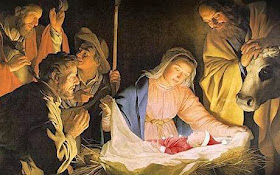As previously announced, the band of faithfuls making up the fellowship of Didymus in Ringwood gathered together for a combined Advent and Christmas service, on 10th December.
The darkness of the tradition of Advent is supposed to be a suitable preparation for the bright light and joy of Christmas, and our gathering attempted to include elements of both.
We had a reading from Isaiah chapter 40 (vv 3-5, 21-24, & 28-31) with its traditional cry for Advent:
Our second reading was "The Journey of the Magi" by T. S. Eliot.
Our third reading was a personal view by Rev Arek Maleck, as published in "The Inquirer" (issue 8073 Dec 2023), regarding how Unitarians are able to celebrate Christmas even without the traditional views about Jesus. Its main message was: “The motivations for embracing traditional lyrics, speaking of miracles, virgin birth, and God incarnate, vary. Some may do it simply for the pleasure of familiarity. But I'd like to think that many of us turn to them out of a realisation of the immense value of metaphor and paradox. This appreciation allows us to immerse ourselves in the Christmas story fully — including submerging our heads in it.....Carl Gustav Jung taught that, oddly enough, the paradox is one of our most valuable spiritual possessions, while uniformity of meaning is a sign of weakness. Hence a religion becomes inwardly impoverished when it loses or waters down its paradoxes; whereas their multiplication enriches, because only the paradox comes anywhere near to comprehending the the fullness of life.”
The personal contribution of the president for the day was as follows.
“Not everyone finds this season a season of cheer and goodwill. If you are finding it difficult preparing for Christmas this year, you are not the only one. This can be for all kinds of reasons.
May we know that we fill a particular hole in the fabric of the universe, and that we are known, better than we know ourselves.
A way of thinking about Christmas is as a time of hope.
If one is not a traditional Christian, or feeling no connection to Jesus at all, then hope for what?
Hope for change — things can’t go on as they are
Hope for company — for the security and warmth that being with others can bring
Hope for peace — for rest from troubles
Hope for clarity and order — that there is some sense to be made of this life
In short, hope for renewal.
The reason the story has stuck so well is that most people love the idea of a new baby.
Many can’t help smiling about such news — seeing a new baby as a sign of the possibility of a fresh start. This chimes neatly with hope for renewal.
This season is not necessarily the season of gold and red and green. There are many reasons why our mood might be coloured midnight blue. Yet the candles of Christmas remind us that goodness overcomes darkness, and that hope is stronger than despair.
It is said that it is better to light one candle than to curse the darkness. But just as no one curses our darkness for us, no one can light a light for us. This is something we need to do for ourselves. As Nick Bains says, self-pity can become an idol, making it all too easy to not hear the whispered language of newness, freedom and vocation.
This season of the potential for abundance is the time to be gentle with ourselves and each other.
If we allow it to, and by the breaking in of grace, what happens at Christmas allows us to believe that opposites can be reconciled. That change will come. That there is a peace that can be found, that there are people who will love us, that there can be a new beginning.
All this comes announced and reflected in the painful, messy, disregarded birth of a human babe, born in discomfort, but full of innocence and potential. In the darkness, but surrounded by light.”






